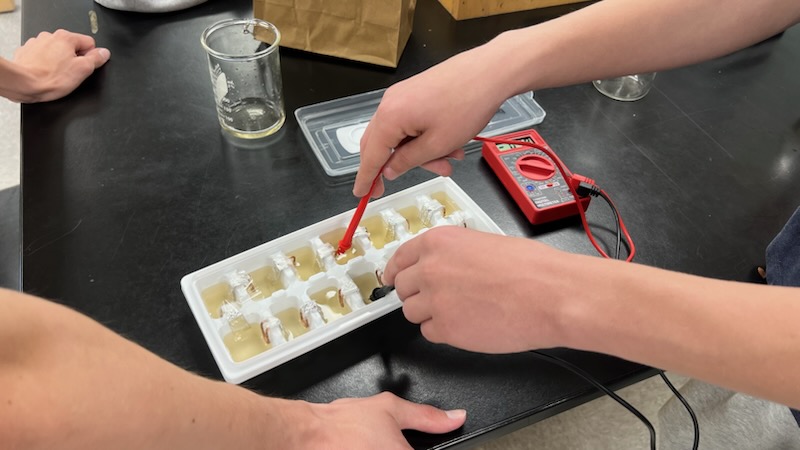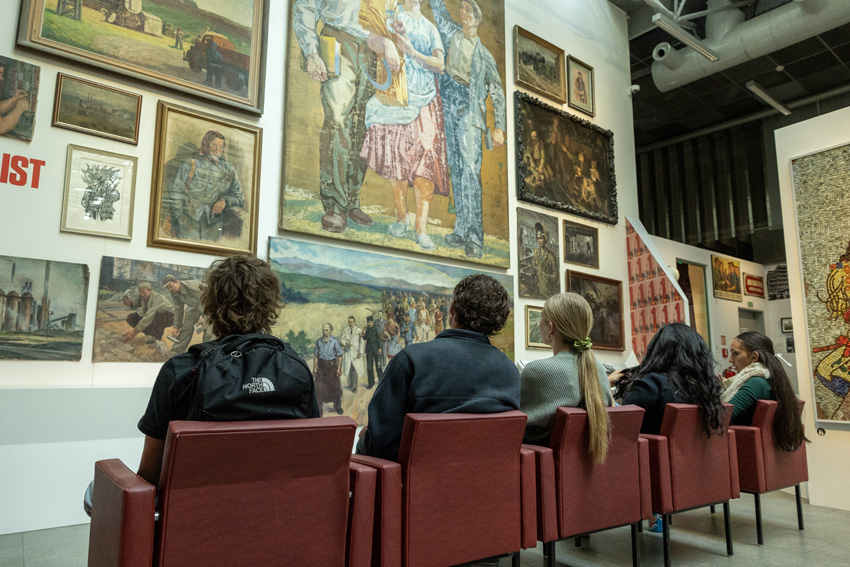While one might expect the valedictorian of a class to have pursued the title throughout high school, Mary Sargent credits her success to an innate curiosity.
This curiosity prompted her to tackle the most challenging classes available, which resulted in her attaining the highest GPA of her class.
Each year, one student from the graduating class is named the valedictorian. Sargent will receive this honor for the class of 2009 and deliver the valedictory at the graduation ceremony.
Ward: How many years have you attended Fresno Christian?
Sargent: All but one. I spent my junior year at Clovis High School.
Ward: Was it your goal to become valedictorian? Did you expect it?
Sargent: It was never my goal. My goal was always to learn as much as possible. I have been gifted with intelligence, and it is more satisfied with knowledge than acknowledgment. It was not a surprise because I have always taken challenging classes and I have excelled in all of them.
Ward: What motivated you to succeed academically?
Sargent: It sort of followed naturally. I love to learn; it is just kind of a natural intelligence, really. I cannot claim credit for achieving valedictorianship. It depends half on your accomplishments, and half on the accomplishments of other people. A valedictorian is the best of a group; it cannot be achieved alone.
Ward: What do you think being valedictorian says about you?
Sargent: As far as it being based on grades, I do not think it says a lot about me besides that I have a knack for memory or some ingrained code to succeed. But on the whole, long-term success in school is dependent upon a deeper curiosity. You cannot survive in school and do well year-after-year if you are not interested in what you are studying.
Fortunately or unfortunately, depending on how you look at it, I am interested in virtually everything. The subjects are not separable to me; you cannot separate science from math or math from art or art from English; they are all intertwined.
Ward: How can you possibly like every subject?
Sargent: I really do love everything because I feel that they are closely related. I do not want to look at something from a single aspect when there are countless other aspects to be explored.
Ward: What do you mean when you say that all the subjects are “closely related”?
Sargent: I believe that God left his mark on the world, and the way to God is in understanding the world. Everything we know is of the world; we cannot understand anything beyond our own experience. So there must be a way to understand God that we identify with. For me, it is the beauty in a painting, or the complexity of an atom, or a hundred different things that leave you in awe every time you think about them.
Ward: Which teacher influenced you the most during high school at FC?
Sargent: Mr. [Mick] Fuller was certainly my most influential teacher. In elementary and junior high, I would always ask questions and the teachers would give me textbook answers. But with Mr. Fuller, he would argue with me, and at the end of the day he gave me his opinion.
At some point in the conversation, I felt like I was missing something and that my reasoning was hollow, which was a very good thing. I realized that I was in the wrong instead of someone telling me that I was wrong. For the first time, I had a class that was thought-provoking; I always went in expecting one thing, and I came out with more questions than I came in with. The debate always morphed and expanded beyond what I had intended it. It was just the first time I had heard wisdom in a way that I could appreciate.
Ward: Do you know what you are going to say in your speech?
Sargent: The valedictory is a bidding of farewell, so in my speech I am trying to incorporate all of this, while still saying farewell and challenging people to be open to altering their perception of the world.
The idea of a valedictorian speech is not only to say goodbye to the years behind you, but also to inspire your class for the years ahead. I think it must be done in a powerful way — a more universal way than the traditional valedictorian speeches.
The challenge is, in the voyage of self-discovery known as college, to discover truth. When people focus on getting a good job, having a family or having enough money to pay the mortgage, they completely lose sight of our ultimate purpose as human beings.
Ward: Are you saying you know the purpose of human beings?
Sargent: I have absolutely no idea. It is something I have tried to discover for the past 10 years or so of my life. These questions have bothered me ever since I was a little kid. I find the quest for answers exasperating at times, but it is so imperative to my character and my soul. I cannot stop asking why.
Ward: What do you mean when you say that you cannot stop asking why?
Sargent: Everyone as a child asks questions. It is whether you keep asking as your life progresses that matters. The maintenance of that holy curiosity gives you real decisions in life. Only when you ask the question “Why?” or “How” can you answer it in different ways. If there is no question, there is no possible answer.
But the problem with the tendency to ask questions is that you get wrapped up in your own existence, and become so entrenched in your own mind that it is impossible to live the very choices that you are fighting for. This is the dichotomy of life.
Ward: Which college do you plan to attend?
Sargent: I will be attending Messiah College in Grantham, Pennsylvania.
Ward: Why did you pick Messiah College?
Sargent: They offered me a four-year, full-tuition scholarship. I also would prefer to go to a college on the East Coast.
Ward: What is your major?
Sargent: Right now my major is in biochemistry, but it could go absolutely anywhere; my interests are wide-ranging. I have been taking science classes for several years, and the end result of a science degree is usually humanitarian in nature; and knowledge to me is something that you must use for the benefit of others.
Ward: What advice would you like to give to the students and faculty you are leaving behind?
Sargent: I do not know if I am qualified to do that. But I would ask students to respect their teachers; they are more than willing to share their wisdom should you display an aptitude and willingness.
The graduation ceremony will begin at 7 p.m. in the Peoples Church sanctuary, May 29.
For a profile on the salutatorian, Mitchell Callisch, visit the May 28 article, Profile on the salutatorian: Senior maintains academic, filmmaking excellence.







Brandon McCormick • Oct 23, 2010 at 12:01 am
I was also one of the people in this group and it took a lot of effort to build it. I was happy with the way the house came out and I know I will like the outcome at the end of the project.
Stephan Melendez • Oct 23, 2010 at 12:01 am
Building the house was so fun, but it also took a lot of time and effort. Yet with the help of my team, we did it!